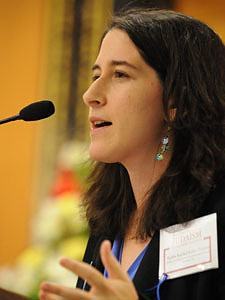What can our love of God teach us about our relationships with other people? Parshat Va’etchanan recalls the details of the covenant between God and Israel at Sinai, a model for the deep, committed relationship that is ideal for connecting to our fellow human beings. This model is especially critical when thinking about finding common ground for social change.
The parshah contains much of the core prayer of Jewish belief, the Shema. As part of the declaration of Israel’s unique relationship with God alone, we are reminded that we must love God with “all of our hearts and all of our souls and all of our might.”[1] This details an all-encompassing commitment grounding our relationship with God both in emotion and devotion.
The language of loving God in the Shema parallels an earlier verse in the parshah, which takes this relationship a level deeper: “But if you search there for Adonai your God, you will find God, if only you seek God with all your heart and with all your soul…God will not fail you nor will God let you perish; God will not forget the covenant which God made on oath with your ancestors.”[2]
The Hebrew word used for searching for or seeking God, tidreshenu, shares a root with drash, the term we use to describe searching for layers of meaning within the Torah. This suggests that to connect to God with all our hearts and souls we have to investigate all aspects of the relationship—much as we must look closely to derive meaning from and truly comprehend a text. Our love must be an examined love. Only once we have reached a place of deep understanding are we able to connect with the ideal love described by the Shema.
Examined love—based on knowledge and not just emotion—should serve as our model in the creation of meaningful connections with other people, especially those we develop in our work for global justice. Yet many people seek to do good in the world out of simple love—rushing to send money or supplies abroad in a spirit of genuine generosity, but without the benefit of greater understanding. However it is critical to seek, to ask people what their needs are rather than imposing our own solutions.
Kenyan activist and scholar Firoze Manji describes this ideal relationship in social justice efforts as follows:
Solidarity is not about fighting other people’s battles…It is not built on sympathy or charity or the portrayal of others as objects of pity. It is not about fundraising to run your own projects overseas, but raising funds which others can use to fight their own battles. It is about taking actions within one’s own terrain which will enhance the capacity of others to succeed in their fight against injustice.[3]
One recent example of the importance of applying this model has been in the worldwide response to the earthquake in Haiti. Watching scenes of terrible devastation, millions of people and many governments sent volunteers and goods before the situation on the ground could be assessed; their impulse to quickly help those in distress overrode concerns about what would be most beneficial in the long run. But the unfolding events in Haiti demonstrated that volunteers going to Haiti without requisite skills can do more harm than good, and distributing donated goods requires a functioning infrastructure to be effective. Both can overwhelm what little support system is still operative in a devastated region.
In contrast, the most effective responders were those whose generosity was rooted in understanding; those who already had in-depth knowledge of the local context, as well as the ability to spend monetary donations in targeted ways. Organizations such as AJWS, which prior to the earthquake was already funding a number of grassroots initiatives in Haiti, or Partners in Health, which already operated medical clinics there, were able to help in such a way as not to worsen economic inequalities nor deepen dependence on foreign aid, but instead, empower local people to address the crisis. These responses came from a place of simple love, but they were grounded in examined love, making their impact more effectual and longer lasting.
If understanding takes our love to a deeper level, how can those of us who are not present in places like Haiti make an impact? A midrash[4] on the Shema explains that to love God with “all of our might” means serving God with our possessions. When we engage in global justice work, our wallets can be profound vehicles for change, supporting those who “enhance the capacity of others to succeed in their fight against injustice.” By giving tzedakah motivated by examined love, we join our hearts and souls to our might. If we work within the context of relationships that we build through understanding, the impact that we make will be enduring.
[1] Dvarim 6:5.
[2] Dvarim 4:29, 31.
[3] Manji, Firoze. “The Depoliticiziation of Poverty.” Development and Rights, ed. Deborah Eade. London: Oxfam GB, 1998, p. 29.
[4] Sifrei Dvarim 32.

